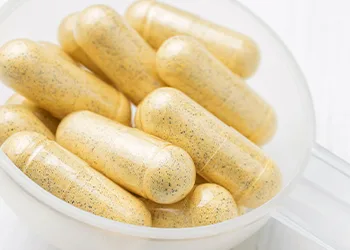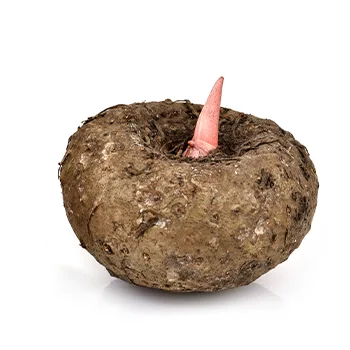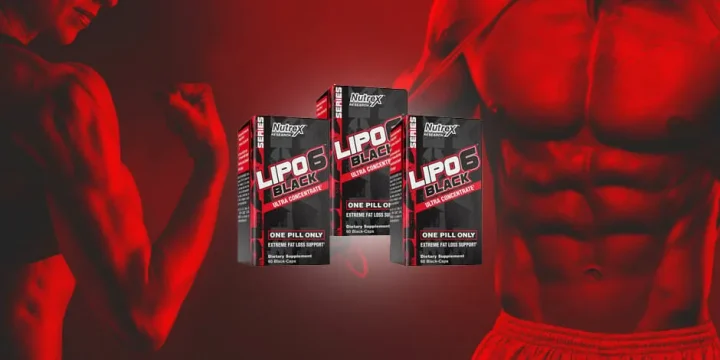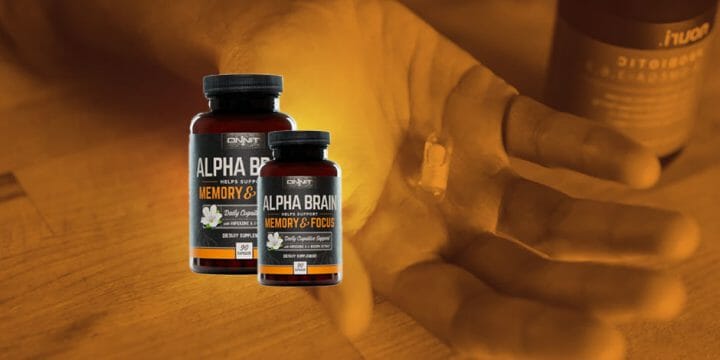As a doctor, I spend a lot of time working with my patients to come up with weight loss and cutting plans.
And because the diet is such a central part of achieving weight loss goals, I’ve spent a lot of time talking to nutritionists about different natural ingredients like konjac glucomannan that can help with those efforts.
To help you understand what benefits glucomannan supplements do and don’t provide, I gathered up all my research into this post.
Let’s dive right in.
Quick Summary
- Glucomannan, a dietary fiber from the konjac plant, is safe for diet efforts and approved by the FDA.
- It aids in weight management by impacting blood sugar and appetite control, and offers health benefits like improved cholesterol levels.
- Research in the Journal of Clinical Nutrition shows glucomannan reduces cholesterol, aids weight loss, and lowers blood sugar levels.
- As a doctor, I find glucomannan beneficial for patients' weight loss plans, especially when combined with a balanced diet and exercise.
Is It Safe To Take Glucomannan For Diet Efforts?

In my professional experience, I've found konjac glucomannan to be safe for diet efforts, aligning with the FDA's classification of it as a dietary fiber [1].
Now, this doesn’t mean that it is an FDA-approved substance, and dietary supplements like this don’t require such approval.
“Dietary fiber that can be declared on the Nutrition and Supplement Facts labels includes certain naturally occurring fibers that are “intrinsic and intact” in plants and added isolated or synthetic non-digestible soluble and insoluble carbohydrates that the FDA has determined have physiological effects that benefit human health.”
- Sharon Spielman, Writer at foodengineeringmag.com
But the FDA generally only considers such labeling decisions when there are only limited or no significant side effects associated with them. And in the case of glucomannan, the known side effects are very limited, according to WebMD [2].
I was unable to find any resources that indicated that glucomannan poses significant risks of allergic reactions, so for most people, it most likely won’t cause any issues.
What Is Glucomannan?
From my experience using glucomannan in patient diets, it's a viscous dietary fiber extracted from the konjac plant, known for its health benefits.
Glucomannan isn't just a modern dietary supplement; it has a rich history in Asian cultures, where it has been revered both as a nutritious food and a traditional medicine, highlighting its multifaceted significance beyond contemporary health trends.
Some of the reasons it was used in traditional Chinese medicine were for [3]:
- Asthma
- Cough
- Detox
- Breast pain
- Skin disorders
While this might still be a common reason for some people to use it, we couldn’t find clinical trials that support these benefits.
But because it’s a fiber that turns into a gel in the stomach, it does have some benefits for your digestive system.
Let’s take a closer look.
How Does Glucomannan Work?

In my clinical observations, glucomannan effectively impacts blood sugar and appetite control, which is crucial for weight management.
The Journal of Clinical Nutrition did extensive research into studies that have evaluated the use of glucomannan supplements.
These studies published in the American Journal of Clinical Nutrition included an assessment of cholesterol levels and weight loss in overweight and obese patients [4].
The results of this research showed that regular use of glucomannan helped:
- Reduce total plasma cholesterol
- Reduce LDL cholesterol
- Promote weight loss
- Reduce blood sugar levels
A further study has revealed that glucomannan is also an appetite suppressant [5]. This would explain why people take it to help with extended fasting periods or avoid snacking between meals.
The result would be a further stabilization of blood sugar and ultimately more successful weight loss efforts.
Related Article: How To Lose Weight Through Nutrition
What Are The Benefits Of Taking Glucomannan?
Based on my experience with patients, glucomannan offers direct benefits like improved cholesterol levels and indirect benefits such as better blood sugar control.
Beyond its popular association with weight loss, glucomannan plays a significant role in managing health conditions like diabetes, high cholesterol, and constipation, offering a natural alternative for those seeking holistic approaches to health care.
First of all, there is a direct impact on low-density lipoprotein cholesterol (LDL), which reduces cardiovascular risk factors, according to the study published in PubMed [6]. This would then further indirectly impact blood pressure with a better cholesterol profile.
There is also a scientific link to insulin resistance syndrome [7]. This would indicate that it influences your blood glucose level, and a more stable blood sugar plays an important role in maintaining a healthy body weight [8].
The main reason my patients take it during cutting phases is the effect on their appetite mentioned above [5]. It seems to help them extend their intermittent fasting times more easily.
What Is The Recommended Glucomannan Dosage?

In my practice, I recommend starting with a 1g dosage of glucomannan, as it aligns with clinical study suggestions and patient tolerability [6].
That seems to be a good starting point if you’re trying to lose weight in a more controlled and sustainable way.
However, other controlled metabolic trial results were also based on doses up to 13g per day [9]. Personally, I think that’s a bit much and could make you feel very bloated.
If you’re starting with a raw powder, then like most viscous dietary fibers, it’s best to start with a small amount of 1g. You can then slowly increase it by spreading the dosage out over the day.
When Should You Take Glucomannan?
I advise taking glucomannan powder early in the morning, especially if you're following a carbohydrate-restricted diet.
This timing aligns well with intermittent fasting strategies, potentially delaying your breakfast to later in the morning and supporting weight loss efforts, according to the Johns Hopkins Medicine [10].
And if you have been struggling with snacking between your main meals, then taking a small glucomannan capsule or other weight loss supplement would help you bridge those gaps without reaching for a donut or candy bar.
Who Shouldn’t Take A Glucomannan Supplement?

In my medical opinion, I advise against glucomannan supplements for patients with sensitive stomachs due to potential digestive issues.
However, because there are limited known side effects of glucomannan, it’s generally safe for healthy adults to take it on a regular basis [2].
For overweight and obese individuals, the question will mainly come down to whether they are suffering from other significant health issues.
If you have a sensitive stomach, then it is possible that it will cause bloating and diarrhea [11].
And there’s one other important thing to keep in mind.
Because glucomannan swells up into a gel when it mixes with your stomach fluid, it might also absorb medication that you take at the same time [12].
So, if you do take oral pills for health issues like blood pressure, make sure you don’t take them at the same time as your glucomannan. Give it at least an hour or more to be on the safe side and talk to your doctor for further advice.
While glucomannan is generally safe, it's crucial to understand its potential side effects and interactions with medications, especially for individuals with specific health conditions, ensuring informed and safe usage of this supplement.
Should You Take It Raw Or As A Dietary Supplement?
In health food stores, you'll find glucomannan in two forms: capsules and powder.
Based on what I've seen in my practice, choosing between glucomannan capsules for consistent dosing and powder for flexibility depends on individual patient needs.
Additionally, some fat burner supplements include glucomannan along with other ingredients, potentially enhancing weight loss results.
Fat burner supplements containing glucomannan:
FAQs
Is Glucomannan Safe for Kidneys?
Yes, glucomannan is safe for kidneys. Research suggests that dietary fiber may also have a protective effect on the kidneys [13].
How Much Weight Can You Lose with Glucomannan?
With a calorie-restricted diet and plenty of exercise, it’s possible to lose 2lbs a week with glucomannan [14]. But how much body weight you lose with glucomannan is entirely dependent on how consistent your diet and exercise efforts are.
References:
- https://www.fda.gov/food/cfsan-constituent-updates/fda-grants-citizen-petition-glucomannan-dietary-fiber
- https://www.webmd.com/vitamins/ai/ingredientmono-205/glucomannan
- https://www.sciencedirect.com/science/article/abs/pii/S0378874110000383
- https://academic.oup.com/ajcn/article/88/4/1167/4650004
- https://www.cambridge.org/core/journals/british-journal-of-nutrition/article/effects-of-gelled-konjac-glucomannan-fibre-on-appetite-and-energy-intake-in-healthy-individuals-a-randomised-crossover-trial/F624117B995B885A7771089C4D725D57
- https://pubmed.ncbi.nlm.nih.gov/6096282/
- https://pubmed.ncbi.nlm.nih.gov/10857960/
- https://www.levelshealth.com/blog/glucose-weight-loss
- https://www.drugs.com/npp/glucomannan.html
- https://www.hopkinsmedicine.org/health/wellness-and-prevention/intermittent-fasting-what-is-it-and-how-does-it-workhttps://www.hopkinsmedicine.org/health/wellness-and-prevention/intermittent-fasting-what-is-it-and-how-does-it-work
- https://www.healthline.com/health/konjac#side-effects
- https://www.rxlist.com/supplements/glucomannan.htm
- https://www.nature.com/articles/ejcn2014237
- https://pubmed.ncbi.nlm.nih.gov/6096282/
About The Author
You May Also Like






